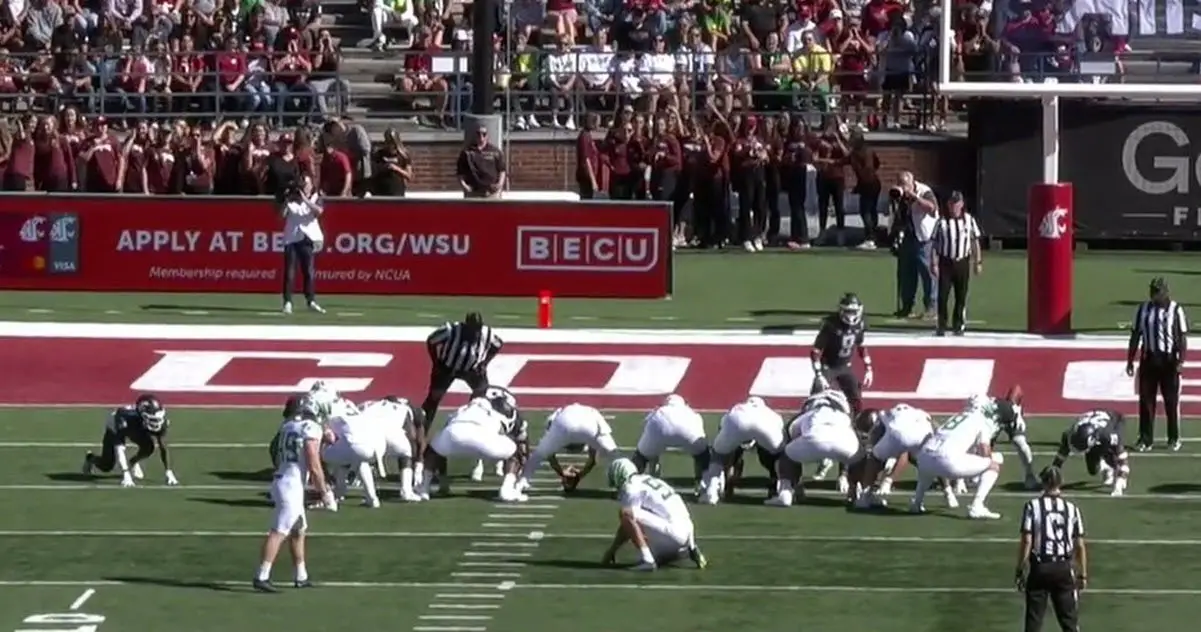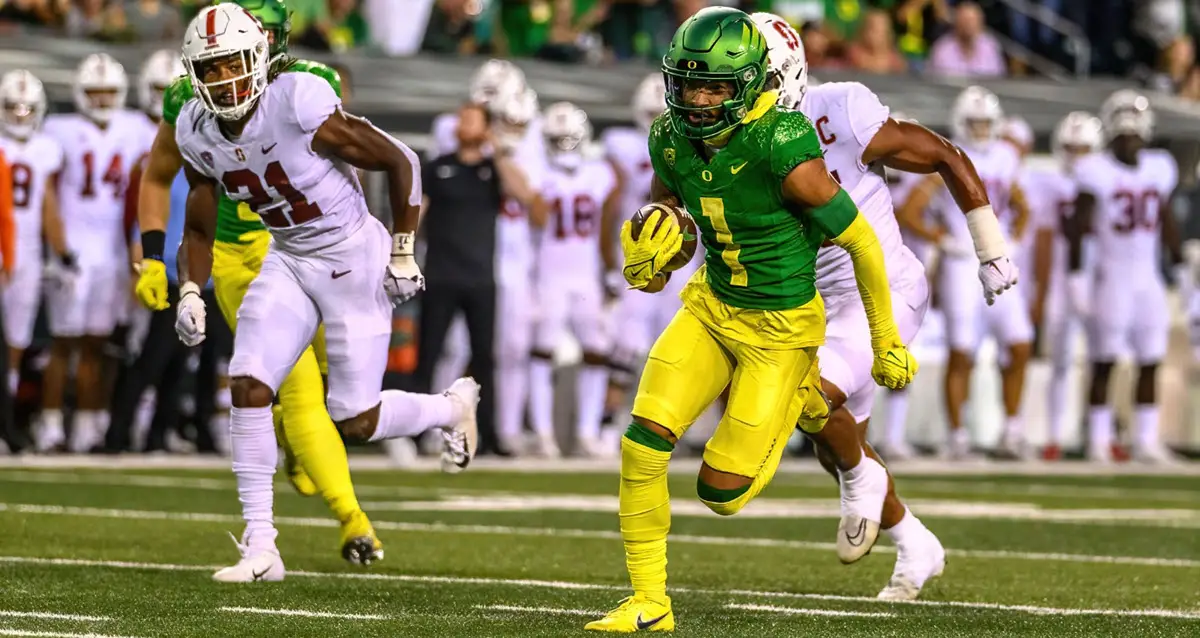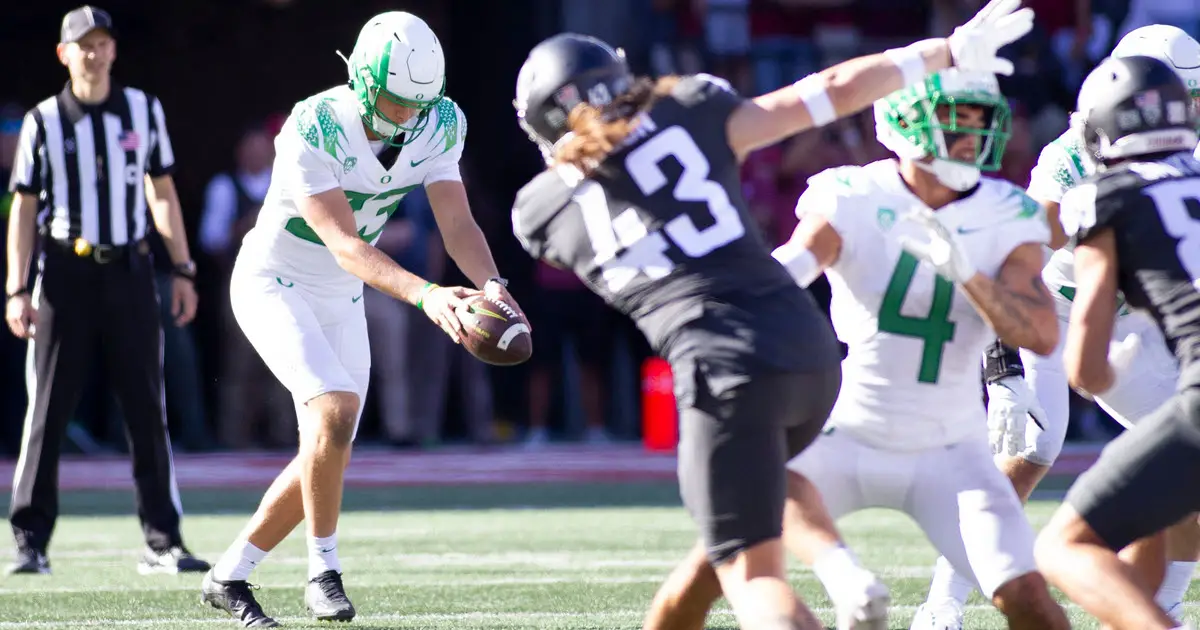So far Oregon’s special teams haven’t been anything special. However, that isn’t entirely a bad thing, as the worst thing special teams can be is a liability. They have, at least not been, that. Oregon’s special teams have simply not been a hindrance but they haven’t been game breaking, either.
Head Coach Dan Lanning and Special Teams Coordinator Joe Lorig have put an emphasis on special teams, so much so that after warm-ups, one of the early practice periods is devoted to special teams. This is a complete change in practice and emphasis over what it looked like under Mario Cristobal, where specialists were an afterthought.
The Kicking Game
During the Cristobal years it was common for kickers to spend the majority of practice completely on their own as they practiced on the second practice field, only to be called up for a few special teams periods throughout the session. Is it any wonder that Camden Lewis, a highly-rated kicker coming out of high school, struggled so much early on in his career when he didn’t get anything that felt like game reps unless it was an actual game?
Lewis did improve drastically last year, and he has been absolutely solid this year. He has been perfect on field goal attempts. What is also interesting is that all his kick attempts have been between 20-39 yards; he has yet to attempt a field goal in the 40 plus range to date.
This is actually brilliant coaching. Lanning and Lorig really understand his range and they aren’t going to put him in a situation where he may be out of that range. Can he make kicks greater than 39 yards? Absolutely — he has done it before — but the goal is to be able to reliably drive the ball into Lewis’ range, and Oregon is doing just that.

Camden Lewis has been perfect on the year so far, but he also hasn’t been asked to kick any long field goals.
It has also been a great benefit for the Ducks to have Lewis just focus on place kicking, as Andrew Boyle has taken over kickoffs. Those kickoffs have been consistent throughout the year; the majority of Oregon’s kickoffs result in a touchback.
Touchbacks are a good thing. They aren’t flashy, but they are consistent. Boyle’s touchback consistency has pretty much rendered opponents’ kick return games non-existent. Sure, there have been some kicks returned for some significant yardage. but on the whole, the kickoffs haven’t put Oregon’s defense in a consistently dangerous position. Some of the better kick returns have resulted in the opposing offense scoring points, though — which is not ideal from a kick coverage standpoint.
Perhaps the greatest weakness on the kicking end of Oregon’s special teams has been punting. Oregon has had two punters start different games this year, Ross James and Adam Barry, and in truth neither has been spectacular. Both are averaging around 40 yards per punt, which is decent, but if you factor in the returns, these punts are closer to 36 yards. Granted Bo Nix has also punted a few times in short punt situations and some of his punts may be affecting the return element.
The biggest factor that the average isn’t telling is the lack of consistency between these two punters. 40 yards as an average would be pretty good if every punt was in that range, but an average includes some really good punts but also some really poor punts. Neither punter has been consistent to date, but the good thing so far is that Oregon hasn’t needed to punt too often.
The Return Game
There isn’t much to talk about for the return game, which is both good and bad. The good news is that Oregon hasn’t had any botched returns that have resulted in turnovers. The bad news is that Oregon hasn’t had any game breaking returns either. But that is in truth OK.

Kris Hutson has the speed to make big plays but he hasn’t done so in the return game yet.
There have been many complaints about Kris Hutson fielding kicks this season in that he usually signals for a fair catch and when he does try to return he usually doesn’t get much for it. Fair catches are fine, the most important job for a kick returner isn’t getting the game breaking play, but to not mess up fielding the ball.
The returner’s job is to first, determine if the kick is returnable, and if it’s not, to clear everyone out to avoid getting touched by the ball — and second, if the ball is fieldable, to catch and secure the ball. Not until those two priories are set does the prospect of a return even become conceivable, and those decisions have to be made with coverage players running full speed. If it doesn’t look like there will be enough space to attempt a return, signaling for a fair catch is not only preferable, it is the right thing to do. Getting hit right after catching the ball can be a disaster waiting to happen, as the ball can get knocked lose and then there is a devastating special teams mistake rather than a boring fair catch.
Does this mean Hutson will never make a game breaking return? No, but Hutson is doing his job, taking care of the football. In order to get that game breaking return there are a lot of factors that aren’t even in the returner’s control. Does he have the space to run? Is there a gap in the coverage for him to run towards? Are there even blockers in place to allow him to make the play? None of those things have been consistently in place for Hutson, so a fair catch is just fine.
Special teams will become special at some point for the Ducks, but for now, can’t we all settle for special teams that don’t hurt the team? Or do we all need to go back to watching the special teams debacles of 2020, especially the multiple special teams turnovers in that year’s Fiesta Bowl? I’d rather live with some boring fair catches for now. How about you?
David Marsh
Portland, Oregon
Top Photo By Harry Caston

Natalie Liebhaber, the FishDuck.com Volunteer Editor for this article, works in the financial technology industry in SLC, Utah.

David Marsh is a high school social studies teacher in Portland, Oregon. As a teacher he is known for telling puns to his students who sometimes laugh out of sympathy, and being both eccentric about history and the Ducks.
David graduated from the University of Oregon in 2012 with Majors in: Medieval Studies, Religious Studies, and Geography. David began following Ducks Football after being in a car accident in 2012; finding football something new and exciting to learn about during this difficult time in his life. Now, he cannot see life without Oregon football.

